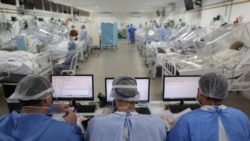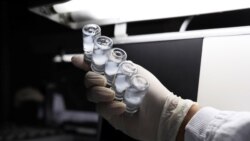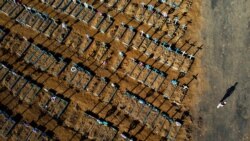On March 15, Brazilian President Jair Bolsonaro announced Marcelo Queiroga would be the country's new health minister – making him the fourth health minister since the start of the coronavirus pandemic a year ago.
Queiroga replaces Eduardo Pazuello, who leaves amid investigations into his handling of the health care in Manaus earlier this year, when overrun hospitals broke down for a second time after running out of oxygen for COVID-19 patients. Pazuello is also being probed to determine whether he committed administrative impropriety in using public money to purchase medicines that are ineffective against the virus, and also whether he failed to take the necessary steps to purchase vaccines.
As Polygraph.info reported in January, members of Brazil's political opposition and various experts, among others, blamed Bolsonaro's administration and the governor of Amazonas state for the crisis. But leaders, including Pazuello, deflected blame.
The day that Bolsonaro announced a new health minister, Pazuello spoke to reporters about the ministry’s progress in fighting COVID-19. He proclaimed “total transparency in all the actions of the ministry,” which were “available for the entire Brazilian population.” He also spoke about vaccinations, saying Brazil ranked fifth worldwide in vaccine distribution and that “more than 11.5 million Brazilians, effectively, from priority groups” had received shots.
Some of Pazuello’s claims were wrong or misleading.
Pazuello took over in an interim capacity in mid-May 2020, and then became health minister four months later. As Brazil emerged as a COVID-19 hotspot, the government rescheduled release of daily COVID-19 statistics to 10 p.m., purportedly to avoid “underreporting and inconsistencies.”
But critics said the move made it harder to get the information out, and news agencies objected because the updated numbers wouldn’t be available in prime time. As Brazil became the country with second-highest number of COVID-19 cases (behind only the United States), and a day after a new record was set in the country for deaths from the virus, the government also stopped publishing cumulative coronavirus cases and deaths, instead releasing only daily figures.
The decision to reschedule the release of daily COVID-19 statistics also was criticized by health specialists, politicians and ordinary citizens alike, who said it muddied the waters and made it harder to track progression of the virus. And since it takes a few days for deaths to be counted, they said it could create a false sense that COVID-19 deaths were decreasing.
The ministry was forced to back down; meantime, six news agencies created a consortium to gather total daily numbers of cases and deaths. That effort is ongoing.
Pazuello's comments about the vaccine rollout exaggerate the country’s progress.
Brazil ranks fifth in the world in the absolute number of vaccine doses administered – more than 13.6 million as of March 22 – but 71st when population size is taken into account, with 6.38 doses for every 100 people. Israel, which leads among nations in the number of vaccines per capita, has 112.5 doses administered for every 100 people.
(Gibraltar, the British overseas territory, ranks No. 1 on the list, with nearly 158 doses for every 100 people. Disregarding vaccination in British territories, Brazil ranks 59th in the world.)
Pazuello’s comment that “more than 11.5 million Brazilians, effectively, from priority groups” have been vaccinated, was misleading.
As of March 15, the day he spoke, nearly 8.9 Brazilians had been vaccinated with at least one dose. Out of the 8.9 million, 2.9 million had received two shots. So while nearly 11.8 million doses had been administered by then, fewer people got shots than Pazuello claimed.
Brazil's COVID-19 vaccine rollout has been much slower than in many other countries. Critics blame Bolsonaro and his administration for consistently downplaying the seriousness of COVID-19 and working against locally imposed lockdowns and other containment methods.
Bolsonaro spent emergency funds to produce and distribute chloroquine, the malaria drug that is ineffective against COVID-19. He also has been openly skeptical about the use of vaccines.
In August, Pfizer offered the Brazilian government 70 million doses of its vaccine produced with BioNTech, but Pazuello’s health ministry was not interested in the deal, calling it “abusive.” Pfizer said its terms were the same offered to other countries, CNN Brasil reported. In December, however, Bolsonaro told Brazilians that if the Pfizer vaccine turned them into “alligators" it was “their problem.”
Bolsonaro also said last October that he wouldn’t buy vaccines from China, even though the health ministry announced the purchase of 46 million doses of China's CoronaVac, and São Paulo's Instituto Butantan, one of the world’s leading scientific centers, had received doses of CoronaVac. Bolsonaro reversed himself a month later, saying Brazil would purchase CoronaVac.
As infections and deaths climbed in Brazil, the government worked to get drugmaker AstraZeneca’s vaccine, making a deal to produce it in Brazil. In January, however, its active ingredient was stuck in China awaiting approval for shipment, Bloomberg reported.
In mid-January, the government prepared a plane to pick up 2 million vaccine doses from India, but plans were delayed for a week, and the doses did not arrive until January 22. Brazil first began vaccinating the people on January 18, with the CoronaVac vaccine in São Paulo. In comparison, the U.S. began its vaccine rollout more than a month earlier, in mid-December.
Then there is the syringe shortage. In early January, Bolsonaro suspended syringe purchases because of high prices. The health ministry said that while there are more than 80 million syringes and needles available, seven out of 26 states are at risk of shortages.
The outbreak continues to worsen in Brazil, which has surpassed the United States to become No. 1 in the world in terms of daily cases and deaths . Brazil cumulatively has recorded some 12 million cases and more than 294,000 deaths, second to the United States.
The Lowy Institute, an Australian think tank, ranked Brazil’s management of the pandemic worst among 98 countries studied.


